Abit NI8 SLI: nVidia SLI for the Intel Gamer
by Randi Sica & Wesley Fink on October 7, 2005 12:05 AM EST- Posted in
- Motherboards
ABIT NI8 SLI: Feature Set (Cont'd)
One of the highlights of this board is the "Silent OTES" cooling solution for the C19 Northbridge. It is an ABIT engineered heatpipe technology. Heat generated by the chipset is noiselessly conducted to the back panel radiator. It does its job very well, but because of the "egg frying heat" generated by the C19 Northbridge, you will definitely want to make sure that you have adequate airflow inside your case. The ABIT uses a non-adjustable 1.4V to its Northbridge, and it is a puzzle that Abit didn't provide the option to go higher. Though the Silent OTES does an admirable job, it is overwhelmed by the considerable heat generated. The OTES concept itself appears to be a good idea, but in this application, an active addition to the party providing some airflow would be welcomed.
ABIT has also included a Post Code debug LED, which can be very useful when trying to diagnose your system out of a problem situation, such as a no boot. An add-in debug card has been part of my test setup for many years and it has been useful in many difficult troubleshooting situations to be able to track and correct a post malfunction.
One of the highlights of this board is the "Silent OTES" cooling solution for the C19 Northbridge. It is an ABIT engineered heatpipe technology. Heat generated by the chipset is noiselessly conducted to the back panel radiator. It does its job very well, but because of the "egg frying heat" generated by the C19 Northbridge, you will definitely want to make sure that you have adequate airflow inside your case. The ABIT uses a non-adjustable 1.4V to its Northbridge, and it is a puzzle that Abit didn't provide the option to go higher. Though the Silent OTES does an admirable job, it is overwhelmed by the considerable heat generated. The OTES concept itself appears to be a good idea, but in this application, an active addition to the party providing some airflow would be welcomed.
ABIT has also included a Post Code debug LED, which can be very useful when trying to diagnose your system out of a problem situation, such as a no boot. An add-in debug card has been part of my test setup for many years and it has been useful in many difficult troubleshooting situations to be able to track and correct a post malfunction.
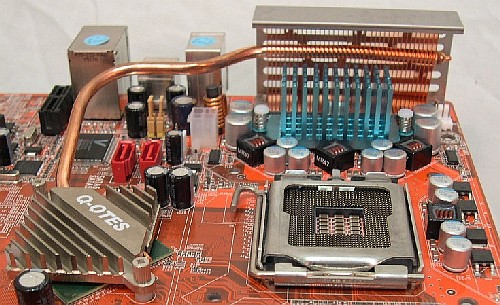

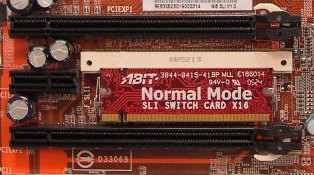
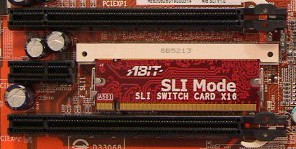
In this photo, the board is switched to dual card "SLI" mode.
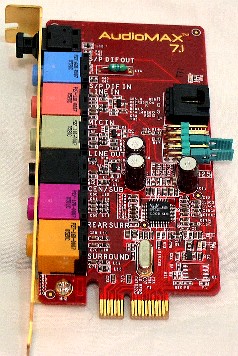
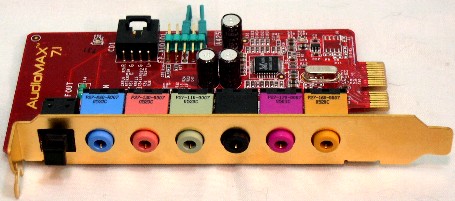











19 Comments
View All Comments
TheInvincibleMustard - Saturday, October 8, 2005 - link
Thanks for clearing that up, Wesley ... here I was thinking that AT had gone off their rockers for a moment :D-TIM
jojo4u - Friday, October 7, 2005 - link
A new Forceware was also used in the gaming tests.smn198 - Friday, October 7, 2005 - link
Agreed. This is not a motherboard test.TheInvincibleMustard - Friday, October 7, 2005 - link
QFT ... what's the point in testing a new board while conveniently slipping a new processor into it as well? That's akin to "Let's compare this Accord versus this Corolla, oh and by the way, the Accord has nitrous, aftermarket shocks, aftermarket brakes, aftermarket muffler ..."Thanks for an article that shows that dual-core is better than single-core in multi-threaded applications ... funny, I thought Anandtech did one of those articles a while back ...
-TIM
PS -- WTF is up with no Firewire on this board? Mobos http://www.newegg.com/Product/Product.asp?Item=N82...">less than $80 shipped have IEEE1394 connectivity for cryin' out loud ...
TheInvincibleMustard - Friday, October 7, 2005 - link
Err ... well ... I tried to QFT, but apparently it didn't work? Whatever, I still agree with you guys.-TIM
ksherman - Friday, October 7, 2005 - link
Man, I REALLY like the passively cooled chipset... wish DFI did that in the nF4 boards...mongoosesRawesome - Friday, October 7, 2005 - link
eh, not so impressed myself. what ABIT did looks expensive and it doesn't get the job done adequately. DFI includes temperature controlled fans in their BIOS, which makes their fans bearable. A nice thing about Nforce 3/4 boards is that you really only have one chip to cool.Who exactly is Abit targeting with this board? Who games with Intel? A64s are cheap, nforce 4 boards are cheap, and they perform better. I realize that in the corporate world, there are people out there that only use Intel, but I figured gamers were different. I just can't see this board really being that popular.
KristopherKubicki - Friday, October 7, 2005 - link
ASUS did it first with the "Premium" series stuff.Kristopher
emc2-1955 - Sunday, August 29, 2010 - link
I got an Abit NI8 SLI with an extreme processor and 4 gig of ram. The problem is that to takes forever to load. I've tried it with windows xp pro and windows 7 can anyone tell me what I chould check any tips